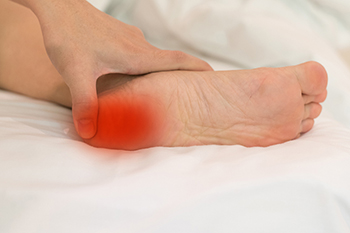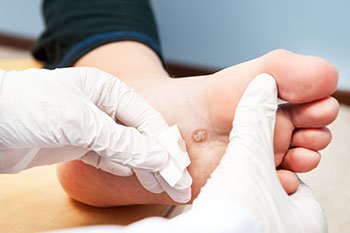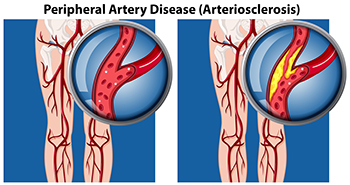Items filtered by date: October 2021
Plantar Fasciitis and Other Causes of Heel Pain
Most heel pain is caused by a local condition occurring in the foot. The most common type of heel pain is due to plantar fasciitis—an inflammation of the long band of tissue running along the bottom of the foot, connecting the toes with the heel. Anyone can have plantar fasciitis. However, athletes and people who are obese or have diabetes, flat feet, or who wear worn out shoes, are more susceptible to developing this painful condition. Heel spurs may often occur along with plantar fasciitis because the strain on the heel bone which causes plantar fasciitis can also lead to calcium deposits forming on the bone (heel spurs). When the bursa sac at the back of the heel becomes irritated and inflamed, this is known as bursitis. A condition called “pump bump” also affects the back of the heel when pressure from wearing pumps causes a painful, bony growth to develop. Podiatrists are very experienced in treating these forms of heel pain and more, so if you experience any heel discomfort, make an appointment today.
Many people suffer from bouts of heel pain. For more information, contact Gary Cockrell, DPM of Tennessee. Our doctor can provide the care you need to keep you pain-free and on your feet.
Causes of Heel Pain
Heel pain is often associated with plantar fasciitis. The plantar fascia is a band of tissues that extends along the bottom of the foot. A rip or tear in this ligament can cause inflammation of the tissue.
Achilles tendonitis is another cause of heel pain. Inflammation of the Achilles tendon will cause pain from fractures and muscle tearing. Lack of flexibility is also another symptom.
Heel spurs are another cause of pain. When the tissues of the plantar fascia undergo a great deal of stress, it can lead to ligament separation from the heel bone, causing heel spurs.
Why Might Heel Pain Occur?
- Wearing ill-fitting shoes
- Wearing non-supportive shoes
- Weight change
- Excessive running
Treatments
Heel pain should be treated as soon as possible for immediate results. Keeping your feet in a stress-free environment will help. If you suffer from Achilles tendonitis or plantar fasciitis, applying ice will reduce the swelling. Stretching before an exercise like running will help the muscles. Using all these tips will help make heel pain a condition of the past.
If you have any questions please contact our offices located in Brentwood and Madison, TN . We offer the newest diagnostic and treatment technologies for all your foot and ankle needs.
Using Ultrasound to Diagnose Peripheral Artery Disease
Peripheral artery disease (PAD) is a circulatory disease that narrows arteries and restricts blood flow in the extremities. This can cause cramping in the legs when exercising, which usually subsides when you stop. PAD can also cause pain, numbness, swelling, and discoloration in the feet, and can be a prelude to more dangerous complications. One of the tests a podiatrist may use to test the blood flow through arteries and veins is a duplex ultrasound. There are two components to a duplex ultrasound. The first is traditional ultrasound which creates an image by bouncing sound waves off of blood vessels. The second is doppler ultrasound which measures sound waves reflected off of flowing blood to visualize its direction and speed. Duplex ultrasounds are non-invasive. The patient remains still as the podiatrist hovers a wand (transducer) over the area to be tested which sends out sound waves. These sound waves are then reflected back and translated into images. To learn more about PAD and various ways to test for it, please make an appointment with your local podiatrist.
Vascular testing plays an important part in diagnosing disease like peripheral artery disease. If you have symptoms of peripheral artery disease, or diabetes, consult with Gary Cockrell, DPM from Tennessee. Our doctor will assess your condition and provide you with quality foot and ankle treatment.
What Is Vascular Testing?
Vascular testing checks for how well blood circulation is in the veins and arteries. This is most often done to determine and treat a patient for peripheral artery disease (PAD), stroke, and aneurysms. Podiatrists utilize vascular testing when a patient has symptoms of PAD or if they believe they might. If a patient has diabetes, a podiatrist may determine a vascular test to be prudent to check for poor blood circulation.
How Is it Conducted?
Most forms of vascular testing are non-invasive. Podiatrists will first conduct a visual inspection for any wounds, discoloration, and any abnormal signs prior to a vascular test.
The most common tests include:
- Ankle-Brachial Index (ABI) examination
- Doppler examination
- Pedal pulses
These tests are safe, painless, and easy to do. Once finished, the podiatrist can then provide a diagnosis and the best course for treatment.
If you have any questions, please feel free to contact our offices located in Brentwood and Madison, TN . We offer the newest diagnostic and treatment technologies for all your foot care needs.
It's Time for Beautiful Feet
Why Is My Child Experiencing Heel Pain?
 Sever’s disease is a common heel pain condition that often affects children between the ages of 9 and 13 who are particularly athletic and involved in sports like soccer, gymnastics, baseball, basketball, and football. It is a result of the bones in the calves growing faster than the Achilles tendon (which connects the calf muscle to the heel). When this happens, the tendon tightens, which can result in a sore or swollen heel. The most common sign of Sever’s disease is heel pain that develops slowly and gets worse with activity. The pain will usually subside with rest and it is not typically present during low impact sports like swimming or cycling. If your child complains of heel pain, consulting with a podiatrist for a proper diagnosis is suggested.
Sever’s disease is a common heel pain condition that often affects children between the ages of 9 and 13 who are particularly athletic and involved in sports like soccer, gymnastics, baseball, basketball, and football. It is a result of the bones in the calves growing faster than the Achilles tendon (which connects the calf muscle to the heel). When this happens, the tendon tightens, which can result in a sore or swollen heel. The most common sign of Sever’s disease is heel pain that develops slowly and gets worse with activity. The pain will usually subside with rest and it is not typically present during low impact sports like swimming or cycling. If your child complains of heel pain, consulting with a podiatrist for a proper diagnosis is suggested.
Sever's disease often occurs in children and teens. If your child is experiencing foot or ankle pain, see Gary Cockrell, DPM from Tennessee. Our doctor can treat your child’s foot and ankle needs.
Sever’s Disease
Sever’s disease is also known as calcaneal apophysitis, which is a medical condition that causes heel pain I none or both feet. The disease is known to affect children between the ages of 8 and 14.
Sever’s disease occurs when part of the child’s heel known as the growth plate (calcaneal epiphysis) is attached to the Achilles tendon. This area can suffer injury when the muscles and tendons of the growing foot do not keep pace with bone growth. Therefore, the constant pain which one experiences at the back of the heel will make the child unable to put any weight on the heel. The child is then forced to walk on their toes.
Symptoms
Acute pain – Pain associated with Sever’s disease is usually felt in the heel when the child engages in physical activity such as walking, jumping and or running.
Highly active – Children who are very active are among the most susceptible in experiencing Sever’s disease, because of the stress and tension placed on their feet.
If you have any questions, please feel free to contact our offices located in Brentwood and Madison, TN . We offer the newest diagnostic and treatment technologies for all your foot and ankle injuries.
When Should I See a Doctor for Foot Warts?
 Plantar warts are skin growths on the bottom of the foot that are caused by the human papillomavirus (HPV). Although these warts are not dangerous and typically go away without treatment, this can take several months or even years. Waiting for the warts to disappear on their own may not be a desirable option if the warts are painful or if they spread. Plantar warts can be easily spread by touching them and then touching another part of your body. You should seek medical care if the warts are painful or showing signs of infection, such as increased swelling, pain, warmth, redness, or pus drainage. Podiatrists use a variety of treatments to remove warts more quickly. These include topical medications, cryotherapy, laser therapy, and surgical removal. If you have foot warts that are bothering you, please consult with a podiatrist.
Plantar warts are skin growths on the bottom of the foot that are caused by the human papillomavirus (HPV). Although these warts are not dangerous and typically go away without treatment, this can take several months or even years. Waiting for the warts to disappear on their own may not be a desirable option if the warts are painful or if they spread. Plantar warts can be easily spread by touching them and then touching another part of your body. You should seek medical care if the warts are painful or showing signs of infection, such as increased swelling, pain, warmth, redness, or pus drainage. Podiatrists use a variety of treatments to remove warts more quickly. These include topical medications, cryotherapy, laser therapy, and surgical removal. If you have foot warts that are bothering you, please consult with a podiatrist.
Plantar warts can be very uncomfortable. If you need your feet checked, contact Gary Cockrell, DPM from Tennessee. Our doctor will assist you with all of your foot and ankle needs.
About Plantar Warts
Plantar warts are the result of HPV, or human papillomavirus, getting into open wounds on the feet. They are mostly found on the heels or balls of the feet.
While plantar warts are generally harmless, those experiencing excessive pain or those suffering from diabetes or a compromised immune system require immediate medical care. Plantar warts are easily diagnosed, usually through scraping off a bit of rough skin or by getting a biopsy.
Symptoms
- Lesions on the bottom of your feet, usually rough and grainy
- Hard or thick callused spots
- Wart seeds, which are small clotted blood vessels that look like little black spots
- Pain, discomfort, or tenderness of your feet when walking or standing
Treatment
- Freezing
- Electric tool removal
- Laser Treatment
- Topical Creams (prescription only)
- Over-the-counter medications
To help prevent developing plantar warts, avoid walking barefoot over abrasive surfaces that can cause cuts or wounds for HPV to get into. Avoiding direct contact with other warts, as well as not picking or rubbing existing warts, can help prevent the further spread of plantar warts. However, if you think you have developed plantar warts, speak to your podiatrist. He or she can diagnose the warts on your feet and recommend the appropriate treatment options.
If you have any questions please feel free to contact our offices located in Brentwood and Madison, TN . We offer the newest diagnostic and treatment technologies for all your foot and ankle needs.



